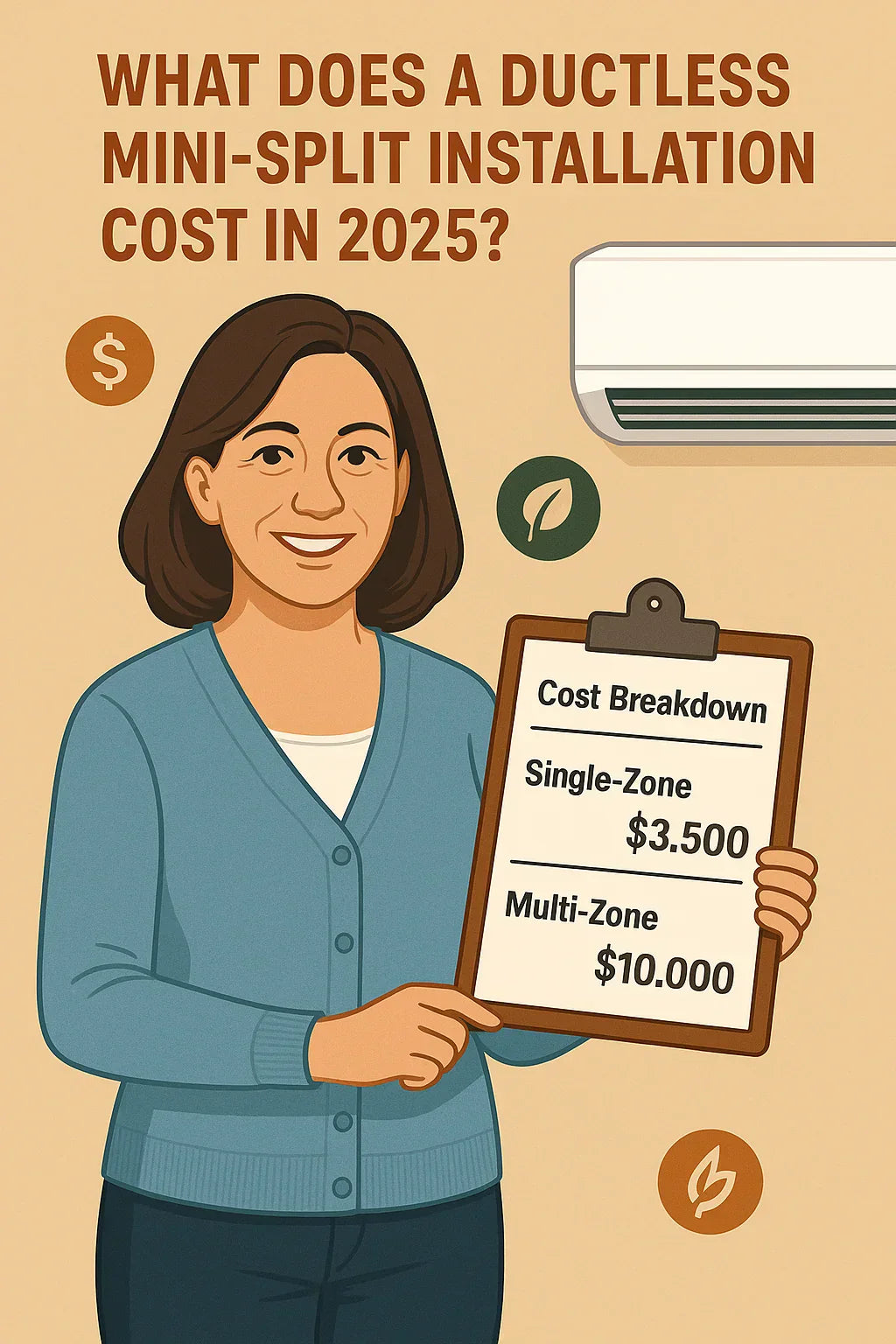🏠 Why Samantha Needs to Understand Costs
Installing a ductless mini-split system is an investment in comfort, energy efficiency, and future energy savings. However, costs can vary widely based on system size, zones, brand, labor, and your home’s unique needs.
Understanding these costs ensures Samantha can:
✅ Set a realistic budget
✅ Avoid unexpected expenses
✅ Compare quotes effectively
✅ Plan for rebates and incentives
✅ Calculate long-term ROI
📊 Average Installation Costs in 2025
National Averages:
| System Type | Installed Cost (Typical Range) |
|---|---|
| Single-Zone | $3,000 - $5,500 |
| Multi-Zone (2-3 zones) | $7,000 - $12,000 |
| Multi-Zone (4+ zones) | $10,000 - $18,000 |
Per BTU Installed Cost: $200 - $400 per 1,000 BTUs depending on system and complexity.
These estimates include:
✅ Equipment
✅ Basic electrical connections
✅ Refrigerant line installation
✅ Wall bracket or pad for outdoor unit
✅ Basic system testing and commissioning
⚖️ Cost Breakdown: Equipment vs. Labor
1️⃣ Equipment (60-70% of cost):
-
Outdoor condenser/compressor
-
Indoor air handlers (1 per zone)
-
Line sets and refrigerant
-
Control systems (remotes, thermostats)
-
Condensate drain kits
2️⃣ Labor (30-40% of cost):
-
Mounting indoor and outdoor units
-
Drilling wall penetrations
-
Running electrical lines
-
Installing line sets and drainage
-
Charging and testing refrigerant
Read about what’s included in professional mini-split installations here.
🛠️ Factors That Influence Cost
✅ System Size: Higher BTUs increase cost. ✅ Number of Zones: More zones = more air handlers and refrigerant lines. ✅ Brand: Mitsubishi and Daikin cost more but offer higher efficiency; Gree and Pioneer are more budget-friendly. ✅ Efficiency Ratings: Higher SEER and HSPF ratings often cost more upfront. ✅ Electrical Work: Upgrading panels or adding circuits can add $500-$2,000. ✅ Line Set Length: Standard installs include ~15 feet; longer runs add cost. ✅ Installation Complexity: Attic installs, multi-floor line runs, or hidden installs cost more. ✅ Permits and Inspections: Required in many municipalities, typically $50-$500.
Learn about factors impacting HVAC installation costs here.
🔌 DIY vs. Professional Installation: Cost Differences
DIY Mini-Split Kits: $1,000 - $3,000 (equipment only)
Pros: ✅ Lower upfront costs ✅ Flexible timeline ✅ Satisfying for experienced DIYers
Cons: 🚫 Risk of improper installation 🚫 May void manufacturer warranties 🚫 Refrigerant handling may require certification 🚫 Potential safety and code compliance issues
Professional Installation: ✅ Ensures proper sizing and refrigerant charge ✅ Preserves manufacturer warranties ✅ Safer and code-compliant ✅ Faster completion
Read about DIY vs. professional mini-split installation considerations here.
🌿 Rebates, Tax Credits, and Incentives
Many ductless mini-splits qualify for: ✅ Federal tax credits under the Inflation Reduction Act ✅ State and utility rebates ✅ Manufacturer promotions
Examples:
-
Up to 30% federal tax credit (max limits apply)
-
Utility rebates of $200-$1,000 per system depending on SEER and HSPF
Check available incentives for your ZIP code here.
📈 ROI and Payback Period
Though the upfront cost may be higher than window units, ductless mini-splits offer: ✅ 20-40% energy savings compared to central systems ✅ Zoned efficiency, cooling/heating only occupied areas ✅ Lower maintenance costs ✅ Long system lifespan (15-20 years)
Example ROI: If Samantha spends $10,000 on a multi-zone system and saves $600/year in energy costs, her payback period would be ~16 years, with additional comfort and efficiency benefits.
💡 Hidden Costs to Plan For
🚩 Permit Fees: $50-$500 depending on your location 🚩 Electrical Panel Upgrade: $500-$2,000 if needed 🚩 Concrete Pad or Wall Brackets: $50-$300 🚩 Surge Protector: $100-$300 recommended for protection 🚩 Disposal of Old Units: $50-$200 🚩 Annual Maintenance: $150-$300/year for professional inspections and cleaning
Planning for these ensures Samantha avoids surprises during installation.
🏆 How Samantha Can Budget Effectively
✅ 1️⃣ Get Multiple Quotes: Request detailed estimates from at least 3 licensed installers. ✅ 2️⃣ Ask About Included Services: Ensure electrical, refrigerant, and commissioning are included. ✅ 3️⃣ Factor in Rebates: Subtract rebates and credits to get your true net cost. ✅ 4️⃣ Choose Efficiency: Higher SEER/HSPF may cost more but save on bills. ✅ 5️⃣ Plan for Maintenance: Regular cleaning keeps your system efficient.
Read Energy Star’s buying guide for ductless systems here.
✅ Conclusion: Is It Worth It?
Yes, if Samantha: ✅ Wants zoned comfort without ductwork ✅ Seeks energy savings and quiet operation ✅ Plans to stay in the home long-term ✅ Wants to reduce her carbon footprint
Ductless mini-splits may have a higher initial cost, but they offer comfort, flexibility, and efficiency that often justify the investment.
📲 Ready to Start?
View our Ductless Mini-Splits Collection to explore high-quality systems and find one that fits your 2025 budget and efficiency needs perfectly.
In the next topic we will read more about: Maintaining Your Ductless Mini-Split: Filters, Coils, and Annual Checkups







